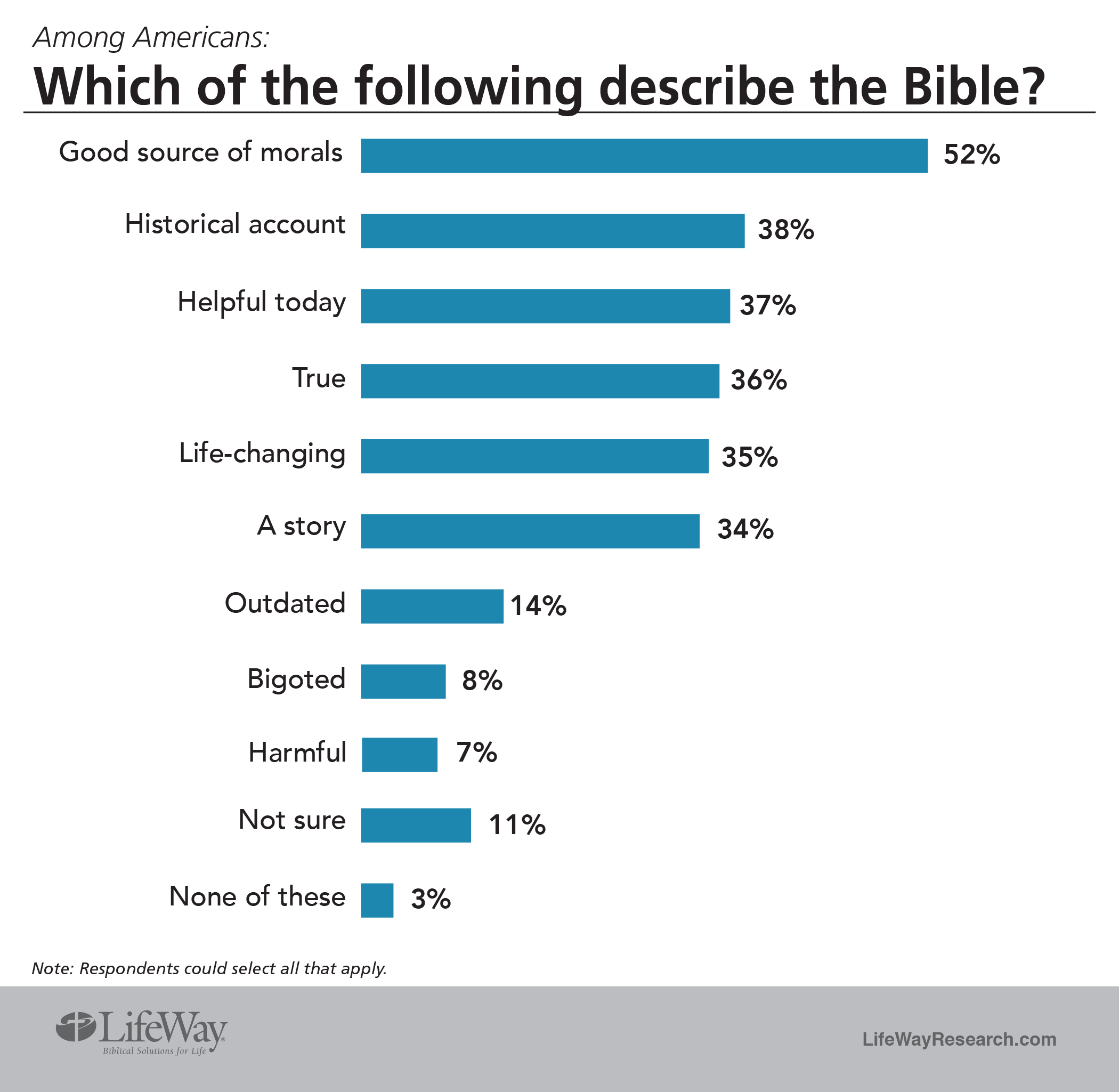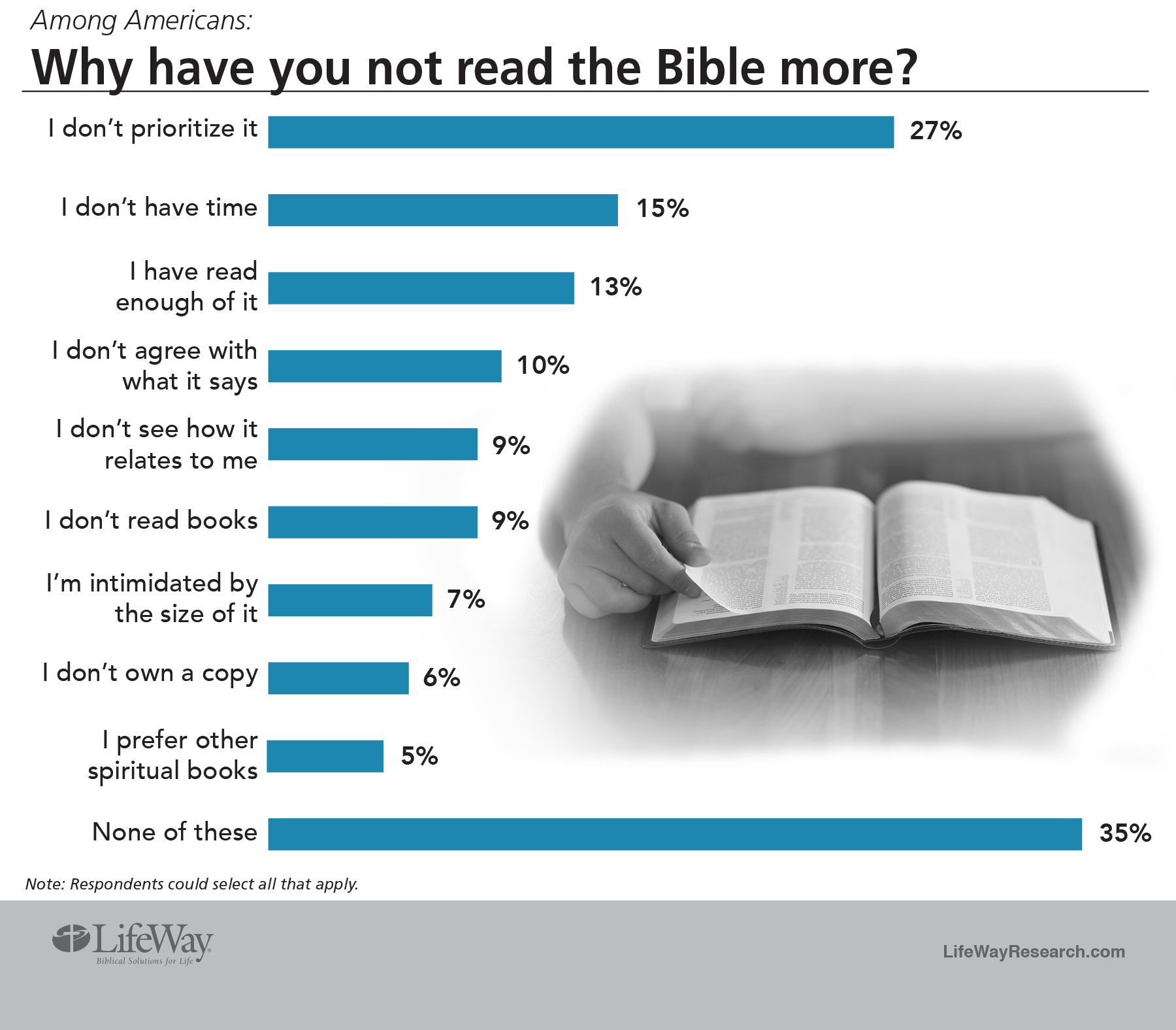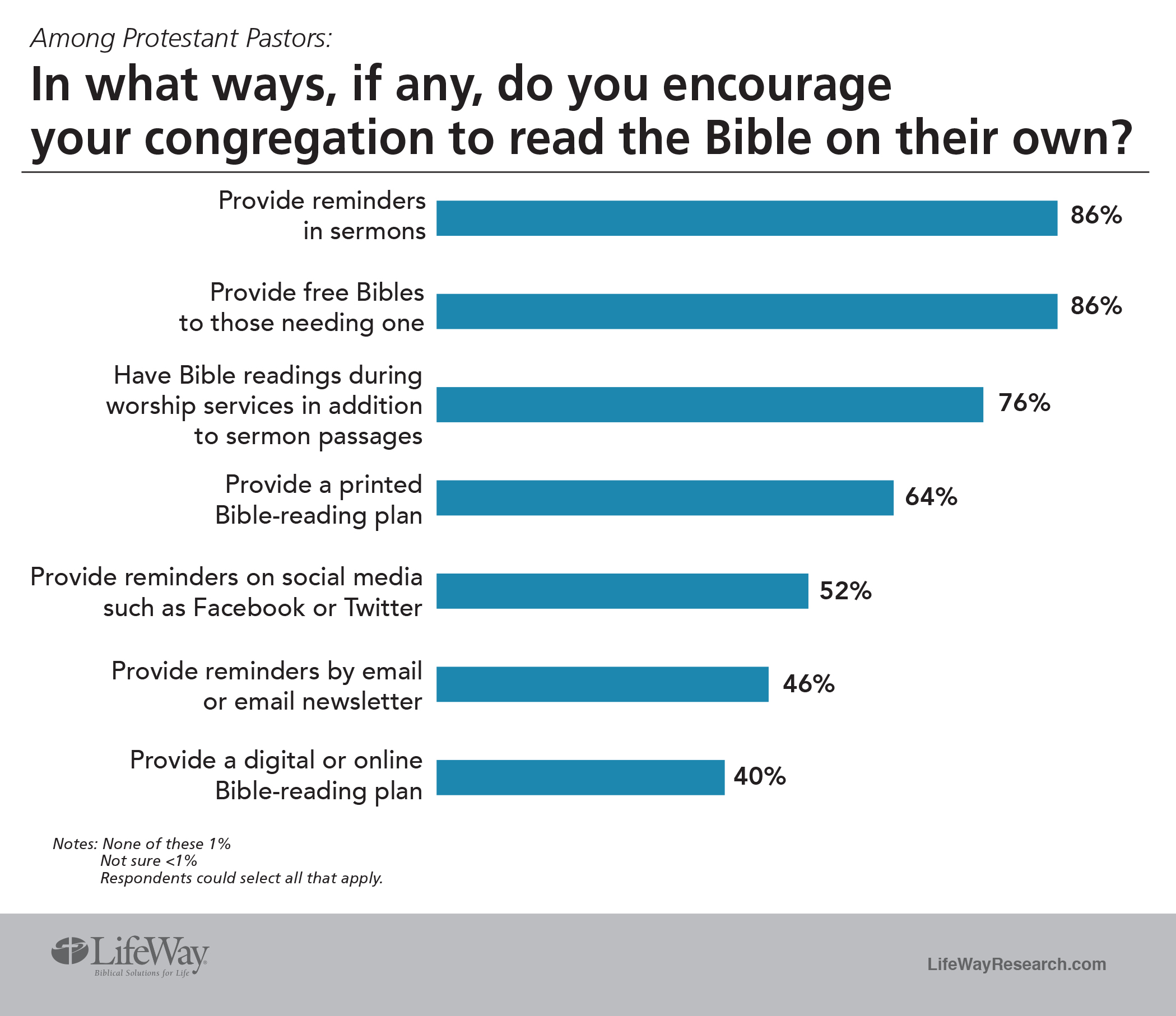Research Shows Bible Reading Most Effective for Change
By Bob Smietana
Americans accept a positive view of the Bible. And many say the Christian scriptures are filled with moral lessons for today.
However, more than than one-half of Americans take read little or none of the Bible.
Less than a quarter of those who have ever read a Bible have a systematic programme for reading the Christian scriptures each day. And a third of Americans never option it upwardly on their own, according to a new report from Nashville-based Lifeway Research.
Small wonder many church leaders worry about biblical illiteracy, said Scott McConnell, executive director of Lifeway Enquiry.
"Almost Americans don't know start-hand the overall story of the Bible—considering they rarely pick it upward," McConnell said. "Even amongst worship attendees less than half read the Bible daily. The only fourth dimension near Americans hear from the Bible is when someone else is reading it."

Many unfamiliar with biblical text
Nigh nine out of 10 households (87 percent) ain a Bible, according to the American Bible Guild, and the average household has iii.
But Bible reading remains spotty.
Lifeway Research surveyed 1,000 Americans almost their views of the Bible and constitute significant splits in how familiar they are with the Christian scripture. One in v Americans, Lifeway Enquiry found, has read through the Bible at least once. That includes xi per centum who've read the entire Bible once, and 9 percent who've read it through multiple times. Another 12 percent say they have read virtually all of the Bible, while 15 percent accept read at least one-half.
About one-half of Americans (53 percentage) take read relatively niggling of the Bible. I in x has read none of information technology, while 13 percentage have read a few sentences. Thirty per centum say they have read several passages or stories.
Americans too differ in how they arroyo reading the Bible. Xx-two percent read a picayune bit each day, in a systematic approach. A tertiary (35 pct) never option information technology up at all, while 30 pct await upward things in the Bible when they need to. 19 percentage re-read their favorite parts, while 17 percentage flip open the Bible and read a passage at random. A quarter (27 percent) read sections suggested by others, while 16 percent say they await things up to help others.
Those with evangelical behavior are more probable (49 per centum) to read a piddling bit each day than those without evangelical behavior (16 percent). Protestants (36 pct) are more likely to read every day than Catholics (17 percent).
The more often Americans attend church, the more likely they are to read the Bible daily. Thirty-ix per centum of those who nourish worship services at least once a month read a bit every mean solar day, while simply 13 percentage of those who attend services less than once month choice up a Bible daily.
Men are more than probable to skip Bible reading than women. Thirty-nine percent of men say they practise non read the Bible on their own, compared to 31 percent of women. Folks in the Northeast (48 percentage) are more than likely to never pick up a Bible than those from other regions.
Bible seen as adept for morals

Overall, Americans have a positive view of the Bible. Thirty-seven percent say it is helpful today, while a similar number call it life-changing (35 percent) or true (36 pct). Half (52 percent) say the Bible is a good source for morals. Few say the Bible is outdated (xiv percent), harmful (vii percent) or narrow-minded (eight percent).
Americans are split over the nature of the Bible as a book. Four in 10 say it's a book worth reading over and over, while 13 percent say it's worth reading once. Xx-2 percent prefer referencing the Bible on an as-needed basis. Five percentage say the Bible is a volume non worth reading at all, while xix per centum are not sure.

A number of reasons keep Americans from reading the Bible, according to Lifeway Inquiry. Most a quarter (27 percent) say they don't prioritize information technology, while 15 percent don't take time. Xiii percent say they've read it plenty. Fewer say they don't read books (9 percent), don't see how the Bible relates to them (nine percent), or don't have a re-create (6 percent). Ten percent disagree with what the Bible says.
Overall, Americans seem to like the Bible just don't have much urgency near reading it, said McConnell.
Pastors do their function
I place Americans are all the same likely to hear the Bible read is in church. And many Protestant pastors try to encourage their flocks to requite the Bible a endeavour.

A Lifeway Enquiry survey of one,000 Protestant senior pastors plant virtually give out free Bibles to those who need them (86 percent), include reminders virtually reading the Bible in their sermons (86 pct) and include Bible readings in worship services (76 percent). Two-thirds (64 per centum) give out printed Bible-reading plans while twoscore per centum provide digital-reading plans. Half (52 percent) send out social media reminders, while 46 percentage send out reminders by email and newsletters.
Still, it appears people may need more than than a program when it comes to reading the Bible, McConnell said.
McConnell said Americans treat reading the Bible a footling chip similar exercise. They know it's important and helpful but they don't exercise it. The key for churches, he said, is finding ways for people to experience how reading the Bible tin change their lives.
"Scripture describes itself equally 'living and effective,' according to the book of Hebrews," McConnell said. "Those who have a addiction of reading through the Bible a niggling each twenty-four hours say they accept experienced this helpful, life-changing quality. Those who approach the book differently tend to say the Bible is positive just much less personal."
Bob Smietana
@bobsmietana
Bob is the former senior writer for Lifeway Research. In September 2018, he joined Faith News Service, where he currently serves every bit a national writer.
Methodology:
Lifeway Research conducted the report Sept. 27 – October. one, 2016. The survey was conducted using the spider web-enabled KnowledgePanel®, a probability-based panel designed to be representative of the U.Due south. population. Initially, participants are chosen scientifically by a random selection of telephone numbers and residential addresses. Persons in selected households are and then invited by telephone or by mail to participate in the web-enabled KnowledgePanel®. For those who agree to participate, but do not already take Internet access, GfK provides at no toll a laptop and ISP connectedness.
Sample stratification and weights were used for gender, age, race/ethnicity, region, metro/non-metro, education, and income to reflect the virtually recent United states of america Census data. The completed sample is 1,000 surveys. The sample provides 95 percentage confidence that the sampling error does not exceed plus or minus 3.1 percent. Margins of error are college in sub-groups.
The phone survey of Protestant pastors was conducted Aug. 22 to Sept. sixteen, 2016. The calling list was a stratified random sample, drawn from a list of all Protestant churches. Quotas were used for church size. Each interview was conducted with the senior pastor, minister or priest of the church building called. Responses were weighted by region to more accurately reflect the population. The completed sample is 1,000 surveys. The sample provides 95 percent confidence that the sampling fault does not exceed plus or minus three.two percent. Margins of error are higher in sub-group.
Lifeway Research is a Nashville-based, evangelical research firm that specializes in surveys about organized religion in civilization and matters that affect churches.
Download the research (American views)
Download the enquiry (Pastor views)
Research Shows Bible Reading Most Effective for Change
Source: https://lifewayresearch.com/2017/04/25/lifeway-research-americans-are-fond-of-the-bible-dont-actually-read-it/